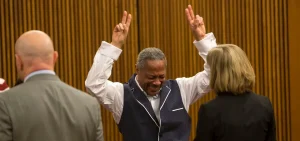News
Here’s what we can take away from conversations with wrongfully convicted Ohioans
By: Erin Gottsacker | The Ohio Newsroom
Posted on:
YELLOW SPRINGS, Ohio (The Ohio Newsroom) — Central Ohio native Richard Horton was released from prison last year — more than a decade after he was wrongfully convicted for a crime he didn’t commit.
“Once I was able to obtain a DNA match that excluded me, that’s kind of when the exoneration process began,” he explained. “A judge granted me a new trial. The state of Ohio had to release me.”

A series from Ohio Newsroom member station WYSO is exploring their stories. Mary Evans is the producer of ReEntry Stories. This season, she spoke with several Ohioans like Horton who were wrongfully convicted.
Nancy Smith also spent years in prison despite her innocence. She was falsely accused of assaulting a child in Lorain, a city on the shore of Lake Erie. In 1994, she was sentenced to 30 to 90 years in prison.
“There was a time when I thought I would never go home,” she said in an interview with Evans. “But I never gave up my faith because I knew that this was man’s time. This was not God’s time. And there were times when I thought He was not with me, you know: ‘Where are you? You’re not with me. Why are you letting me go through this?’”
Smith was released from prison in 2009, and after a long battle with the courts, the charges against her were dropped in 2022. She’s never been compensated for the 15 years she spent behind bars.
“There’s a lot of individuals who will never see a dime or be compensated for their wrongful conviction served time because they ultimately took a dark plea,” Evans said. The term refers to a plea deal offered after someone is convicted of a crime, especially if they’re seeking a new trial. It forces the defendant to decide whether to continue claiming innocence and seeking exoneration through the court system, or to plead guilty in exchange for release from prison.
Evans joined the Ohio Newsroom to explain what she’s learned about deals like these and the state of wrongful convictions in Ohio through her conversations.
This conversation has been lightly edited for clarity and brevity.
Wrongfully convicted Ohioans on common threads
“What you hear from [wrongfully convicted Ohioans] is the injustices that they went through. And I think the common thread is even with this wrongful conviction and exoneration, many ultimately end up with a guilty charge anyway, in a dark plea situation where they’re released, but they’re released with a consequence or a sanction.”
On what it takes to be exonerated
“You have to have claimed innocence the whole time for the Ohio Innocence Project to even pick up your case. And then [if they can find] new evidence, they submit it. Sometimes you have prosecutors who will concede and they’ll start the process that way, or the judge and the prosecutor will agree to put the individual on to a new trial. So ultimately, sometimes what happens is they’ll have to post a bond from prison, or they’ll have some kind of stipulation to be released from prison to go back through the whole trial process, call all their witnesses, take it in front of a jury and try to get a different conviction.”
On what the media gets wrong
“I think sometimes the mainstream media, they don’t talk about the mistakes that happen in our criminal justice system. It’s always about the convictions and what someone did and how much time they’re facing. And also [media spread] stereotypical perspectives about the individual, making them out to be someone that they’re not. There’s a lot of misinformation that happens as well. And I think that’s where the media misses the mark the most, is just not following the story all the way through, or not having an open mind to hear both sides of it.
“I think there needs to be more focus on some of these issues like these wrongfully convicted individuals and what that does to them, their families and what it makes the system look like as a whole.”
On why Ohioans are wrongfully convicted
“I think personally that people just miss the opportunity to get it right. And then when they do figure out that they didn’t get it right, instead of just doing the right thing, it still takes these individuals through a process where they have to relive all those moments and go through the trial and all those things. For the most part, people make mistakes. There are a lot of systems that are not perfect and have a lot of loopholes and big gaps that make this kind of stuff possible.
“I wouldn’t say that it’s a conspiracy, that everyone in the justice system does everything wrong. But I think it speaks volumes when you have 962 collectively wrongfully convicted years that were served just in the state of Ohio. And then when you think about all 50 states in the United States, you know, Ohio’s just one of those states that has this issue. It’s happening all over the United States.”
On changes for the future
“In the state of Ohio, [lawmakers] have proposed the Conviction Integrity Act, which will address challenges faced by individuals who are seeking to overturn wrongful convictions based on new evidence. If they accept this proposal and it [becomes] part of our legislation, it [would give] individuals who are wrongfully convicted an easier process to submit that new evidence and then hopefully be granted a new trial or a new opportunity to plead their case.”

